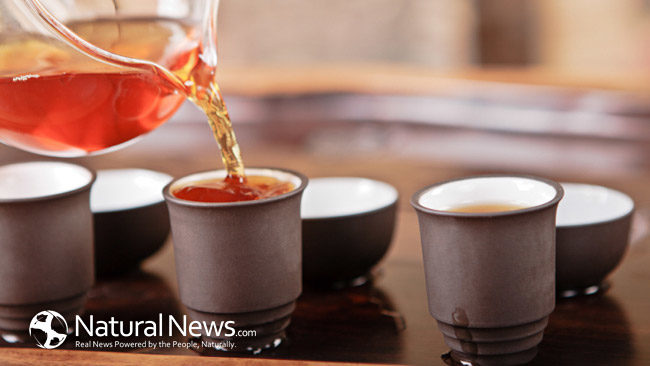The everyday beverages like coffee and tea are well-known mind stimulants- improve the mental alertness, wakefulness and help you feel energized.
What does the trick here?
For coffee, it is the caffeine. For tea, it is the synergistic effect of caffeine, polyphenolic antioxidants, and theanine. That’s why tea performs better than coffee when it comes to brain and cognitive health.
A review published in the Journal of Nutrition, Health, and Ageing, June 2010 observed that regular consumption of tea, irrespective of the tea variety (black, green and oolong tea) reduces the risk of cognitive impairment in older Chinese adults. Coffee consumption didn’t bring any improvement in cognitive performance.
If all the tea varieties are good for your brain, then what is so special about oolong tea? Well, it has a perfect blend of decent health benefits with better taste. In simple terms, it is a hybrid of green tea and black tea.
Let us know Oolong tea
Oolong tea is a low-caffeine, traditional Chinese tea which is manufactured mainly in parts of China and Taiwan.All kinds of teas (black, green and oolong) are manufactured from the leaves of a common plant- Camellia Sinensis. The degree of oxidation (fermentation) varies during the tea manufacturing procedure. The black tea is highly oxidized whereas the green tea goes unoxidized. The oolong tea lies in between- it is partially (semi) oxidized. That’s why it holds the health benefits related to green tea, but, with a mild, earthy taste. Unlike the green tea, it doesn’t taste grassy or bitter.
The oolong tea contributes only 2% of the total tea production whereas green tea is 20%. But, it is catching up very fast because of the taste advantage.In recent times, there has been a steep rise in its popularity. The habitual coffee and black tea drinkers find its taste more appreciable and easy to adapt to in comparison to green tea.
Oolong tea is good for Brain health
Let us discuss how the various nutrients in oolong tea make your brain work better
- Theanine (L-theanine)
It is a natural amino acid with potent psycho-protective properties. It relaxes the mind by inhibiting the overproduction of cortisol (stress hormone) without inducing drowsiness.
Stress and anxiety can spike the blood pressure levels by stimulating the central nervous system to release vasoconstricting hormones in excess. In a case study reported in the Journal of Physiological Anthropology, Oct 2012- it was observed that theanine and caffeine, both can help reduce stress and ensure a small increase in blood pressure level while dealing with physical and psychological stressful conditions. However, theanine performed better than caffeine.
- Antioxidants
The phytochemicals (plant chemicals) in oolong tea act as antioxidants. They neutralize the free radicals in your body to prevent oxidative damage. As the brain utilizes around 20% of all the oxygen that you breathe in it is most susceptible to be damaged by the oxidative stress caused by free radicals. The polyphenolic antioxidants, particularly ECGCs and catechins can help halt this process.
- Caffeine
Caffeine is a naturally occurring compound in leaves and seeds of various plants. The various food sources of caffeine are coffee, tea, soda, soft drinks, energy drinks, and chocolate. Caffeine, within the safety limit, is good for your health. It stimulates the central nervous system to lift the mood, improve concentration and alertness and reduces fatigue.
Caffeine content in Oolong tea
As noted above, overconsumption of caffeine can be troublesome. The possible damaging effects of excessive caffeine intake are:
- Body dehydration
- Acidic body pH
- Gut irritation and worsening of gut issues like acid reflux, bowel inflammation, and leaky gut
- Insomnia
According to the latest guidelines of the European Food Safety Authority, the safety limit of daily caffeine intake is 400 mg for normal, healthy adults. One cup of brewed coffee contains around 100-120 mg of caffeine. Hence, 2-3 cups of brewed coffee everyday are quite a safe bet.
According to the Linus Pauling Institute, caffeine content in oolong tea is almost one-fourth that of brewed coffee, when consumed in the same amount. Also, various commercially available brands of oolong tea and green tea contain similar amounts of caffeine.
How much to drink
Consume 3 cups of oolong tea everyday for optimum results, preferably one hour after the meals. Do not drink it empty stomach in the morning or before the breakfast because it can cause stomach upset. Also, avoid drinking it late at night to avoid sleep disturbance.
How to make oolong tea
Take a teaspoonful (2 grams) of oolong tea in a cup and pour 6-8 ounces of boiled water over it. Let it steep for 3-5 minutes, strain the tea and your refreshing oolong tea is ready. For convenience, some people refer tea bags instead of loose tea leaves.
Take away message
The unique brain boosters like theanine and ECGC team up with caffeine for improved brain functioning. It is a low-caffeine elixir with health benefits similar to green tea. Despite the widespread health benefits of green tea, many habitual coffee (and black tea) drinkers find it hard to switch over to it because of its taste. For them, oolong tea seems a perfect alternative.
Author bio
This post is submitted by Ashish Agarwal. Check his blog- Health Melody to know more about the health benefits of Oolong tea.
References
https://www.ncbi.nlm.nih.gov/pubmed/20617284
http://www.sciencedirect.com/science/article/pii/S2213453015000555
http://jphysiolanthropol.biomedcentral.com/articles/10.1186/1880-6805-31-28#CR9
http://www.pnas.org/content/99/16/10237.full
http://www.efsa.europa.eu/en/press/news/150115
http://lpi.oregonstate.edu/mic/food-beverages/tea





